Buying Real Estate in Riviera Maya: Everything You Need To Know
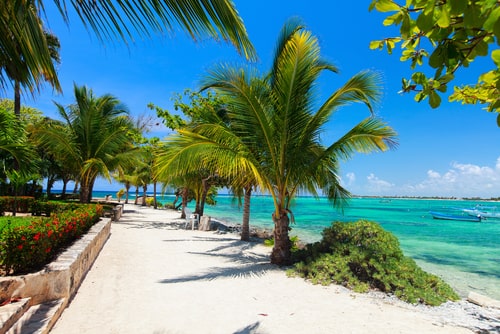
From colonial towns to beach resorts, Mexico offers a vast variety of locations in which to buy a home.
©shutterstock.com/Rubi Rodriguez Martinez
The Riviera Maya, nestled along Mexico’s stunning Caribbean coast, has emerged as a prime destination for real estate investment. Known for its turquoise waters, white sandy beaches, and vibrant culture, this region attracts millions of tourists and investors alike. Towns such as Playa del Carmen, Tulum, and Puerto Aventuras are at the forefront of this booming market, offering opportunities for short-term rentals, long-term investments, and vacation homes.
This comprehensive guide will walk you through everything you need to know about investing in Riviera Maya real estate, from legal considerations to the best areas to buy and how to maximize returns.

Reviewed by Ronan McMahon
Ronan McMahon is an Amazon best-selling author and expert in international real estate. He regularly contributes to Overseas Dream Home. Visit his website at ronanmcmahon.com
Can a Foreigner Own Property in the Riviera Maya?
Yes, foreigners can own property in Riviera Maya, but there are specific regulations to follow. Properties within the restricted zone—50 kilometers (31 miles) from the coast or 100 kilometers (62 miles) from international borders—must be held through a fideicomiso, or bank trust. This arrangement grants foreign buyers full ownership rights while the bank acts as trustee.
Alternatively, investors planning to purchase multiple properties or operate a business may opt to establish a Mexican corporation. This route simplifies the process and allows direct ownership of properties, even within the restricted zone. Both options are legally secure and widely used by foreign investors.
Steps to Owning Property in the Riviera Maya
Owning property in the Riviera Maya is an exciting opportunity that requires careful navigation of local regulations and processes. The first step is to find a trusted real estate agent who is licensed and experienced in the Riviera Maya market. A knowledgeable agent will not only guide you through available properties but also ensure the process adheres to local laws and meets your specific needs. It’s important to verify their credentials and research reviews to confirm their reliability.
The next essential step is hiring a bilingual lawyer fluent in both English and Spanish. Your lawyer will play a critical role in reviewing contracts, verifying ownership documents, and ensuring the property is free of debts or liens. They will also explain legal jargon and ensure your interests are protected at every stage of the process.
As a foreign buyer, if the property you’re buying is located within the restricted zone—50 kilometers (31 miles) from the coastline or within 100 kilometers (62 miles) of an international border, you will need to set up a fideicomiso, or bank trust. Alternatively, if you are buying commercial property or investing as a corporation, you can establish a Mexican corporation. Your lawyer and a Mexican bank will help you set up the fideicomiso or corporation, as this is a legal requirement for non-Mexican citizens.
Due diligence is a crucial part of the process. This includes conducting a thorough title search to verify the property’s ownership history and ensure it is free of any legal encumbrances. Reviewing zoning laws, building permits, and potential restrictions tied to the property is also essential to avoid any surprises down the line.
If financing is necessary, you will need to decide whether to secure it through Mexican banks or U.S.-based lenders that specialize in overseas purchases. Cash buyers can proceed more quickly, but understanding financing options is critical for those needing additional support.
The purchase process typically takes between 60 and 90 days. After agreeing on terms with the seller, you will sign a sales agreement known as a promesa de compraventa, which locks in the price and terms. A deposit, usually 5%–10% of the property price, will then be paid. Your notary public, or notario público, will prepare the deed, known as the escritura pública, and ensure all legal and tax obligations are fulfilled. Once the remaining balance is paid, the deed is officially recorded, finalizing your ownership.
After the purchase is complete, you will need to register the property with the public registry to finalize your ownership rights. Keeping up with property taxes, known as predial, and any applicable maintenance fees will ensure you remain in compliance as a property owner in Mexico.
By following these steps and relying on experienced professionals, you can navigate the process with confidence and begin enjoying your property in the beautiful Riviera Maya.
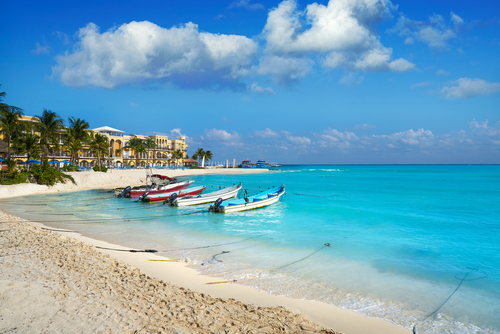
The Riviera Maya is one of the hottest travel destinations in the world…good news if you’re thinking of buying a home here. ©Shutterstock.com/lunamarina
What Are the Closing Costs for Real Estate in Mexico?
When purchasing property in the Riviera Maya, it’s important to factor in closing costs, which typically range from 5% to 9% of the property’s value. These costs cover several essential expenses required to complete the transaction legally and securely.
One of the primary components is the acquisition tax, which is calculated at 2% to 4% of the purchase price. This tax is a mandatory part of property purchases in Mexico and contributes to the legal transfer of ownership.
Notary fees are another significant expense. A notary public (notario público) plays a crucial role in formalizing the transaction by preparing the deed, verifying the legality of the sale, and ensuring that all taxes and fees are paid. Their involvement is required under Mexican law for real estate transactions.
Legal fees are also necessary to have a lawyer review contracts and ensure compliance with Mexican property laws. This step protects your interests by verifying that the property is free of legal encumbrances and that the transaction adheres to local regulations.
You’ll also need to pay some title registration fees. This involves officially recording the deed with the public registry, a critical step in safeguarding your investment. Additionally, obtaining a certificate of no liens is essential to confirm that the property is debt-free and clear for sale.
In addition to these one-time closing costs, property owners in Mexico benefit from exceptionally low annual property taxes, known as predial. These taxes range from 0.1% to 0.3% of the property’s assessed value. For instance, on a US$300,000 property, annual taxes would amount to only $300 to $900—a fraction of the property tax rates in many other countries.
Understanding these costs upfront allows you to budget effectively and ensures a smooth property purchase process in the Riviera Maya. Working with experienced professionals, such as a notary, lawyer, and real estate agent, can help you navigate these expenses confidently and protect your investment.

Sign up to Overseas Dream Home now, and Discover The Best Places in the World to Buy Real Estate 2025.
Enter your email now to download The Best Places in the World to Buy Real Estate in 2025.
You’ll also start receiving your free Overseas Dream Home eletter in your inbox every day!
No-spam pledge: We value your privacy. You can unsubscribe at any time.
Can You Get a Mortgage for Property in Mexico?
Financing property in Mexico is possible, but it requires careful consideration of the available options and their associated costs. Local Mexican mortgages are an option; however, they often come with higher interest rates, typically ranging from 9% to 12% and the process is more complicated if you’re a non-resident. This can make them less attractive compared to other financing methods, especially for international investors.
One popular alternative is using a home equity loan from your home country. By leveraging equity in a property you already own, you can access funds to purchase property in Mexico without taking on a high-interest local mortgage. Another common approach is opting for a cash purchase, which simplifies the transaction process, eliminates financing-related hurdles, and may give you stronger negotiating power with sellers.
For expats and foreign buyers, specialized lenders in Mexico offer tailored mortgage solutions. These institutions understand the unique needs of international clients and are equipped to navigate the complexities of cross-border financing. Collaborating with a lender experienced in expatriate financing can significantly ease the process, ensuring your mortgage aligns with both local regulations and your financial goals.
By exploring these options and working with professionals who specialize in international property transactions, you can choose the financing route that best suits your needs while making the process as seamless as possible.
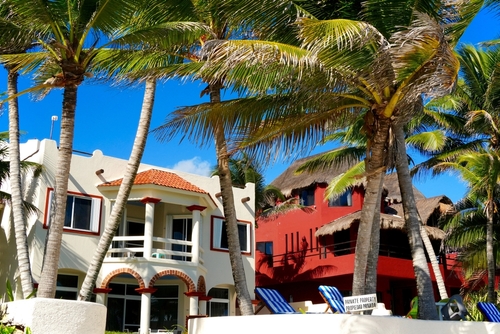
Buying a home on the Riviera Maya is straightforward when you have the right team of professionals helping you. ©Shutterstock.com/George Wirt
Best Types of Real Estate in the Riviera Maya
The Riviera Maya offers diverse real estate options to suit different investment goals, lifestyles, and budgets. Choosing the right property type depends on your preferences and whether you aim to use it as a personal retreat, rental income source, or long-term investment.
Condos
Condos are a popular and practical investment choice for buyers seeking affordability and low-maintenance properties. These units typically come with modern amenities like swimming pools, gyms, and 24-hour security, offering convenience and appeal to both vacationers and long-term renters.
Location plays a critical role in a condo’s value and rental potential. Condos situated near beaches, vibrant downtown areas, or tourist hotspots like Playa del Carmen’s iconic Fifth Avenue command higher rental rates and enjoy consistent demand. This makes them an excellent choice for investors interested in short-term vacation rentals. Condos also suit those looking for a turnkey solution, as many come fully furnished or as part of managed complexes with rental programs.
Houses and Villas
For buyers seeking larger, more private properties, houses and villas offer unmatched luxury and space. These properties are ideal for group travelers, families, and luxury-seeking vacationers, often featuring private pools, rooftop terraces, lush gardens, and expansive interiors.
Investing in houses or villas typically requires a higher upfront investment compared to condos. However, the rental income potential is significant, particularly in sought-after locations like Tulum, Playa del Carmen, and Akumal. These areas attract affluent tourists willing to pay a premium for privacy and upscale amenities. Additionally, owning a villa or house gives you greater flexibility to customize the property to your liking or to further enhance its rental appeal.
Choosing the Right Property Type
When deciding between condos, houses, or villas, it’s important to evaluate your goals. If you’re prioritizing ease of management and lower costs, condos are an excellent entry point. On the other hand, if you’re targeting high-end renters or seeking a long-term asset with strong appreciation potential, a house or villa may be the better choice.
Both property types have unique advantages, making it essential to work with a knowledgeable real estate agent who can guide you toward the best investment for your needs. With the right strategy, owning real estate in the Riviera Maya can be a rewarding and lucrative endeavor
Best Areas to Invest in Riviera Maya Real Estate
Playa del Carmen
Playa del Carmen, often referred to as the heart of Riviera Maya, offers a perfect balance of urban living and beachside allure. This bustling tourist hub is ideal for property investors looking to tap into consistent rental demand.
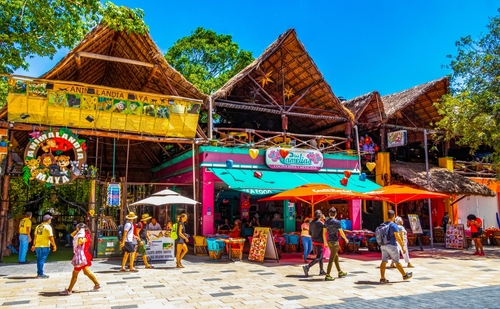
Vibrant Playa del Carmen is the buzzing heart of the Riviera Maya.
©Shutterstock.com/Arkadij Schell
If you’re aiming for short-term rental income, focus on properties located along Fifth Avenue or near Mamitas Beach, where tourists flock for nightlife, dining, and direct beach access. Condos and boutique apartments in this area often deliver high occupancy rates year-round, thanks to Playa del Carmen’s reputation as a vibrant destination. For long-term investments, consider properties slightly removed from the downtown core, which appeal to families and expats seeking quieter, more affordable living options.
Playa del Carmen’s real estate market is well-established, making it a reliable choice for investors who value stability and year-round demand.
Tulum
Tulum has rapidly evolved into a global hotspot for eco-luxury living and sustainable tourism. Known for its bohemian charm, wellness-focused retreats, and pristine beaches, Tulum is a magnet for high-end travelers and investors.
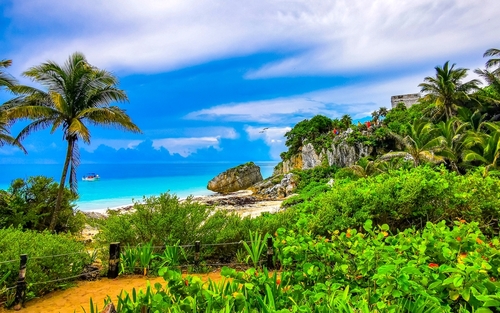
Tulum has long been known for its Mayan ruins and beautiful beaches, but it’s also a city on the rise.
©Shutterstock.com/Arkadij Schell
The city’s ongoing development, including the upcoming Tulum International Airport and the Mayan Train, positions it as a growth market with tremendous potential. When investing in Tulum, prioritize areas like Aldea Zama, a master-planned community blending modern amenities with nature, or La Veleta, known for its boutique developments and jungle-inspired designs. Beachfront properties remain the gold standard, offering unparalleled rental income potential, especially for vacation homes catering to affluent tourists.
With its eco-conscious appeal and strategic infrastructure projects, Tulum is a forward-thinking investment destination with room for substantial appreciation.
Puerto Aventuras
For investors seeking an exclusive, tranquil atmosphere, Puerto Aventuras stands out as a prime location. This gated community is designed for those who value privacy and upscale living, featuring marinas, golf courses, and private beaches.

Puerto Adenturas is popular with families, boating enthusiasts and golfers.
©Shutterstock.com/photun
Properties here appeal to a specific demographic: families, retirees, and luxury travelers looking for a relaxed yet refined experience. Waterfront homes with private docks are perfect for boating enthusiasts, while golf course villas attract a steady stream of high-income renters. Condos in Puerto Aventuras also perform well in the long-term rental market, offering security and community-oriented amenities.
Puerto Aventuras combines a serene environment with high-end amenities, making it an excellent choice for investors targeting premium buyers or renters.
Akumal
Akumal, meaning “Place of the Turtles,” is a hidden treasure in Riviera Maya. Known for its calm turquoise waters and sea turtle habitats, it’s the ideal destination for eco-conscious travelers and nature enthusiasts.
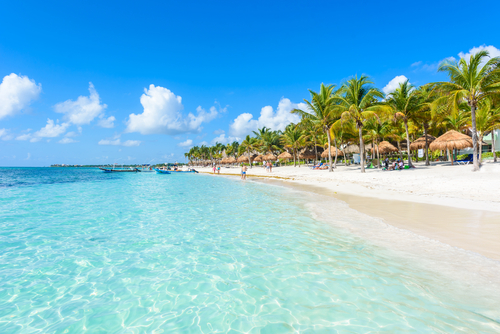
Charming Akumal offers the ultimate in tranquil Caribbean living.
©Shutterstock.com/Simon Dannhauer
For investors, Akumal offers unique opportunities. Beachfront villas and boutique vacation rentals see high demand, especially during turtle nesting season. Properties here cater to travelers seeking quiet escapes and a connection with nature, providing steady rental income. Unlike the bustling centers of Playa del Carmen and Tulum, Akumal’s charm lies in its peaceful vibe and untouched natural beauty, making it a standout choice for those prioritizing serenity and sustainability.
Akumal’s tranquil appeal and steady rental demand ensure it remains an excellent investment for those looking to combine natural beauty with reliable returns.
Legal Considerations for Property Ownership
Owning property in Mexico requires an understanding of the legal framework to ensure compliance and avoid potential issues. Below is a guide to the key legal considerations for property ownership, particularly in the Riviera Maya.
Taxes
If you plan to generate rental income from your property, be aware that it is taxable in Mexico. As a foreigner, you must register with SAT (Mexico’s tax authority) to comply with the country’s tax regulations. Rental income can be taxed in one of two ways:
- Flat Tax: Pay a flat 25% on gross rental income without deductions.
- Net Tax with Deductions: Opt to pay taxes on net income after deducting allowable expenses such as maintenance, property management fees, utilities, and repairs.
Consult a bilingual accountant or tax advisor familiar with Mexican law to determine the best option for your situation and ensure timely filing of taxes to avoid penalties.
Licensing for Short-Term Rentals
In tourist-heavy areas like Tulum and Playa del Carmen, municipalities require permits for short-term rental properties. These permits are crucial for staying compliant with local laws and avoiding fines or disruptions to your rental business.
To obtain a short-term rental license:
- Check Local Requirements: Each municipality has unique regulations regarding vacation rental permits.
- Submit Necessary Documentation: You may need proof of property ownership, tax compliance, and property details.
- Renew as Required: Permits often require annual renewal to maintain compliance.
Working with a local real estate agent or legal expert can simplify the licensing process.
Tenant Rights for Long-Term Rentals
If you plan to lease your property for extended periods, it is vital to understand that Mexico’s legal system often favours tenants in disputes. As a landlord, this requires taking proactive steps to ensure your rights are protected while maintaining compliance with local laws.
The first step is to draft a detailed lease agreement. This document should include all the essential terms of the rental arrangement, such as the agreed rent amount, the duration of the lease, and the responsibilities for property maintenance. It is also crucial to address potential issues like late payments or property damage by clearly outlining penalties for non-compliance. A comprehensive lease agreement serves as the foundation of a smooth landlord-tenant relationship, minimizing misunderstandings and disputes.
Since Spanish is the official legal language in Mexico, it is important to have a lease agreement written in both Spanish and English. While the English version is helpful for foreign tenants, the Spanish version ensures the document is enforceable in legal proceedings. A bilingual agreement also builds trust and clarity, reducing the likelihood of miscommunication.
In some cases, registering the lease with local authorities may be necessary. Although this step is not always mandatory, it strengthens the legal standing of the agreement. Registration provides an official record of the lease, which can be invaluable in the event of a dispute. It also demonstrates compliance with local regulations, which can help avoid potential penalties or legal challenges.
Mexico’s legal framework provides significant protections for tenants, which landlords must navigate carefully. Evictions, for example, can be a lengthy and complex process, requiring legal justification and adherence to specific timelines. Tenants are often granted grace periods for late payments, and landlords must respect these provisions to avoid complications. Understanding these tenant-friendly laws is crucial for managing your property effectively and avoiding unnecessary legal disputes.
To safeguard your investment, it is highly recommended to work with a bilingual lawyer experienced in Mexican property law. A qualified lawyer can assist in drafting lease agreements, ensuring compliance with local regulations, and representing your interests in legal matters. Their expertise ensures that your agreements are both enforceable and aligned with your goals as a property owner.
Effective property management also plays a key role in minimizing conflicts. Maintaining open communication with tenants, addressing maintenance issues promptly, and conducting regular property inspections can help foster a positive relationship. By being proactive and informed, you can confidently navigate Mexico’s rental market while protecting your rights and ensuring the long-term success of your investment.
Why Invest in Riviera Maya Real Estate?
Investing in Riviera Maya real estate is a smart move for those seeking a profitable and lifestyle-enhancing opportunity. Below is a guide to the key reasons why this region stands out as a top investment destination.
Booming Tourism Drives Rental Demand
The Riviera Maya attracts over 20 million visitors annually, solidifying its position as one of the world’s most popular tourist destinations. This thriving tourism industry fuels a constant demand for rental properties, ranging from short-term vacation stays to long-term housing for expats and digital nomads. As an investor, you’ll benefit from high occupancy rates year-round, particularly in tourist hotspots like Playa del Carmen, Tulum, and Akumal.
High ROI Potential
Real estate in Riviera Maya offers exceptional returns on investment. Short-term vacation rentals typically yield annual returns of 10%–15%, especially in prime locations near beaches or tourist hubs. For those seeking steadier, long-term income, leases cater to expats and locals looking for permanent housing, providing a reliable revenue stream. With the right property management strategy, you can maximize profitability regardless of your preferred rental model.
Low Costs Enhance Profitability
One of the most attractive aspects of owning property in Riviera Maya is the low cost of ownership. Property taxes, known as predial, are exceptionally low, averaging between 0.1% and 0.3% of the property’s assessed value. Maintenance costs are also affordable, particularly for condos and managed properties with shared amenities. These low overhead expenses significantly enhance your net profitability compared to other global markets.
Lifestyle Appeal
Beyond the financial benefits, investing in Riviera Maya real estate offers the chance to own a piece of paradise. This region is famed for its white sandy beaches, turquoise waters, vibrant culture, and unparalleled natural beauty. Owning property here means you can enjoy the benefits of a tropical lifestyle while having the option to generate income when you’re not using the property. Whether as a vacation retreat or a permanent residence, Riviera Maya offers an unbeatable quality of life.
Take Action on Your Investment
To successfully invest in Riviera Maya real estate:
- Work with Local Experts: Partner with a knowledgeable real estate agent and a bilingual lawyer who understand the local market and legal requirements.
- Choose the Right Property Type: Decide whether a condo, house, or villa aligns with your goals. Condos are low-maintenance and affordable, while villas and houses offer luxury appeal and higher rental income.
- Understand Legal and Financial Considerations: Ensure compliance with local tax laws, rental licensing requirements, and property regulations to protect your investment.
By understanding the factors driving demand and taking strategic steps, you can make a sound investment in Riviera Maya real estate that combines financial success with the joy of owning property in a tropical paradise.
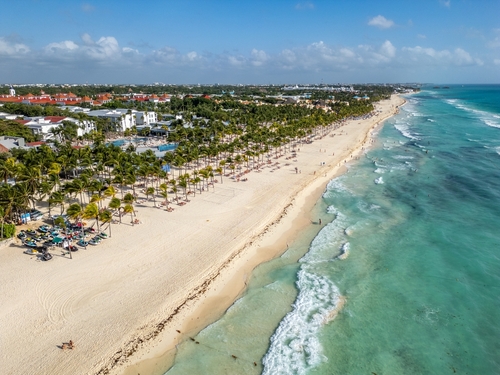
Mexico’s Riviera Maya offers a lifestyle and home to suit all tastes and budgets.
©Shutterstock.com/feelthedrone
Ready to Invest in Riviera Maya Real Estate?
The Riviera Maya is more than just a tropical paradise—it’s a thriving hub of opportunity for real estate investors. With its vibrant culture, world-class tourism, and a rental market offering exceptional returns, this region is the perfect place to achieve both financial success and personal enjoyment.
Whether your goal is to capitalize on the booming short-term rental market or secure long-term stability through leases, this guide has provided the essential steps and insights to navigate the process. From understanding legal considerations to selecting the best property type and location, you are now equipped to make informed investment decisions in this rapidly growing market.
The next step is action. Begin by partnering with trusted local professionals, conducting thorough research, and identifying the right property to meet your investment goals. With careful planning and execution, you can turn the dream of owning property in the Riviera Maya into reality.
Take the first step toward owning your slice of paradise and securing your financial future. The Riviera Maya is waiting for you—start your journey today.

Sign up to Overseas Dream Home now, and Discover The Best Places in the World to Buy Real Estate 2025.
Enter your email now to download The Best Places in the World to Buy Real Estate in 2025.
You’ll also start receiving your free Overseas Dream Home eletter in your inbox every day!
No-spam pledge: We value your privacy. You can unsubscribe at any time.